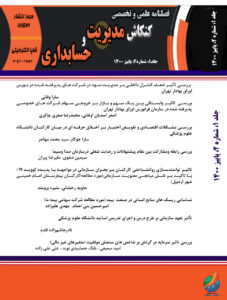مقاله: پژوهشی
صفحه: 119- 143
نویسندگان:
مهدی نبیپورافروزی*[1]، مهدی علیاکبرنیاء عمران[2]، مصطفی یزدانجو[3]، آزاده سبحانی[4]
[1] دانشجوی دکتری، گروه علوم اجتماعی و رفتاري، مالی(مهندسی مالی)، دانشکده مدیریت، پردیس بینالملل ارس دانشگاه تهران، ارس، ایران.
[2] دکتری مهندسی صنایع، عضو هیات علمی موسسه آموزش عالی آمل-آمل، ایران.
[3] دکتری مالی(مهندسی مالی)، مدیر امور شعب استان تهران، بانک ایرانزمین.
[4] دانشجوی کارشناسیارشد، مدیریت مالی، دانشگاه آزاد اسلامی واحد فیروزکوه، ایران.
چکیده
مشارکت مالی در کشور در طول چند سال گذشته بهطور چشمگیر و قابل ملاحظهای بهبود یافته است. در سالهای اخیر، افزایشی درتعداد مشارکتکنندگانی مشاهده شده است که حسابهای بانکی دارند، باور و اعتقاد بر این است که این رقم درحال حاضر باید نزدیک به 80 درصد باشد. شرکتهای تجاری تکنولوژیمالی در کشور بهصورت پیشروندهای قابل توجهتر میشوند همانطور که دولت همچنان به کار خود ادامه میدهد و سخت تلاش میکند تا خدمات مالی را به بخشی از جامعه بسط و گسترش دهد که کمتر از حد معمول با بانک سرو کار داشته باشند. برای دستیابی به بخشها و قسمتهایی از جامعه که کمتر از حد معمول با بانک سر و کار دارند و برای فراهم ساختن یک محیط عملیاتی ثابت و یکنواخت برای کارهای تجاری و کسب و کارهای تکنولوژیمالی، کشور باید درصدد آن باشد تا مشارکت مالی را افزایش دهد. در این تحقیق، رگرسیون و رابطهی همبستگی بهکار گرفته شدند، البته بههمراه دادههای ثانویه که از بازرسی مبتنی برریسک جمعآوری شده است، تا اینتاثیر مورد و تجزیه و تحلیل قرارگیرد. هدفآن بود تا تاثیرتکنولوژی مالی و خدمات مالی دیجیتال برروی مشارکت مالی تعیین و مشخص گردد. برطبق نتایج حاصله، شرکتهای تجاری تکنولوژیمالی بهصورت معناداری به مشارکت مالی دراین کشور کمک کردهاند، بهخصوص برای طبقهی متوسط. این یافتهها برای سیاستگذارانی مفید خواهد بود که سختکار میکنند تا هرفردی در آن کشور را وارد یک سیستم مالی سازماندهی شده کنند.
کلمات کلیدی:
تکنولوژی مالی، خدمات مالی، مشارکت مالی، قصد و نیت رفتاری، اعتماد به سرویسدهی، قابلیت استفاده، تاثیر و نفوذ احتماعی.
Mehdi Nabipourafrozi*[1], Mehdi Aliakbarnia Omran[2], Mustafa Yazdanjo[3], Azadeh Sobhani[4]
[1] PhD student, Department of Social and Behavioral Sciences, Finance (Financial Engineering), Faculty of Management, Aras International Campus, Tehran University, Aras, Iran.
[2] PhD in Industrial Engineering, member of the faculty of Amol-Amol Institute of Higher Education, Iran.
[3] Ph.D. in Finance (Financial Engineering), Manager of Tehran Province Branches, Iranzmin Bank.
[4] Master’s student, financial management, Islamic Azad University, Firuzkoh branch, Iran.
abstract
Financial participation in the country has improved significantly over the past few years. In recent years, there has been an increase in the number of participants who have bank accounts, and it is believed that this figure should be close to 80% by now. Financial technology companies in the country are becoming more significant trends as the government continues to work hard to expand financial services to a segment of society that is less likely to deal with banks. In order to reach the sectors and parts of the society that deal with the bank less than usual and to provide a stable and uniform operating environment for commercial works and financial technology businesses, the country should try to increase financial participation. In this research, regression and correlation were used, along with secondary data collected from risk-based inspection, to be influenced and analyzed. Its purpose was to determine and determine the impact of financial technology and digital financial services on financial participation. According to the results, financial technology business companies have significantly contributed to financial participation in this country, especially for the middle class. These findings will be useful for policy makers who are working hard to bring everyone in the country into an organized financial system.
Keywords:
Financial technology, financial services, financial participation, behavioral intention, trust in service, usability, potential impact and influence.
